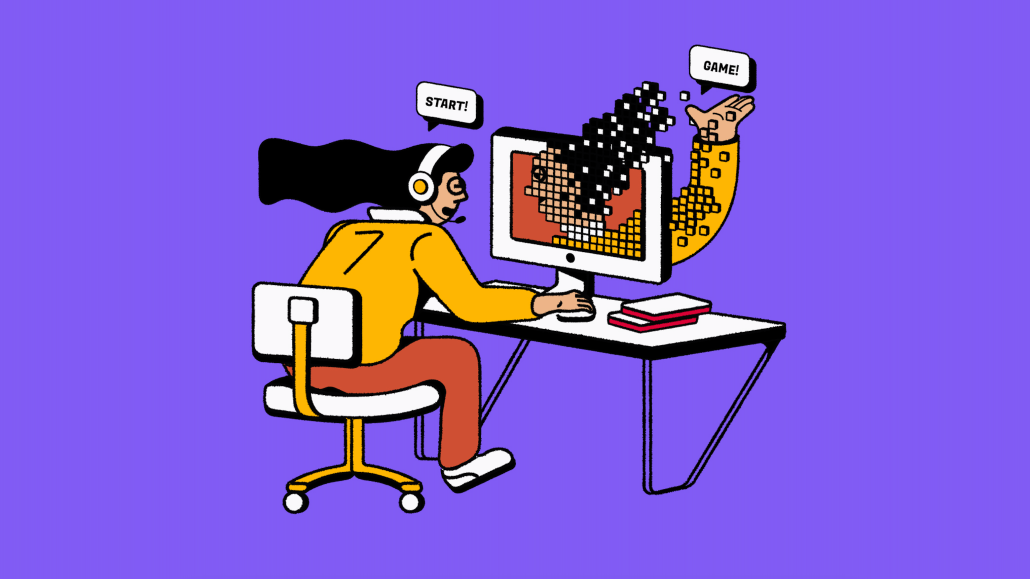Save 50% on a 3-month Digiday+ membership. Ends Dec 5.
Esports orgs and their sponsors focus on wholesome brand activations to get fans to engage

To win over fans who are skeptical of corporate influence, esports organizations and their brand partners are rolling out activations that engage with and directly benefit both their players and fans.
With brands jockeying to reach the 18 to 34-year-old demographic via gaming and esports, it’s become evident that brand partnerships need some kind of hook or special angle to convince fans that they are more than just advertisements. This is a particular challenge for non-endemic brands: most viewers will take it in stride if a streamer features an endemic logo such as G Fuel in their overlays, but a non-gaming brand like Starbucks might raise some eyebrows. “In general, when we look to do partnerships, we shy away from ever having, like, a logo slapped on our jerseys,” said Cloud9 CEO Jack Etienne. “We want to be able to have a meaningful impact on our partners’ business — or they have a meaningful impact on our business in some way.”
Last year, Cloud9 teamed up with Kaiser Permanente for “Presence of Mind,” a mental health initiative that paired Kaiser Permanente clinicians with Cloud9 players and staff to talk about mental health in gaming in the hopes of sparking community conversations on the topic. Against the backdrop of a pandemic-fueled mental health crisis this spring, the organization started production on the second season of “Presence of Mind” videos. Kaiser quickly realized players took the content to their own pages, said Kaiser Permanente psychiatrist Gino Mortillaro, adding that “… they would take those discussions and create even more from it to bring that to the community.”
In addition to issues such as mental health, top esports orgs and their sponsors are narrowing in on social justice to reach an audience that is increasingly morally and ethically conscious as it grows up. FaZe Clan, as an example, highlighted its own diverse user fanbase with a recent partnership with McDonald’s in which FaZe members sampled the fast food. “FaZe Swagg is the most high-profile Black streamer in the world, and he’s trying to show the world that Black and brown creators are at the forefront of everything taking place in gaming,” said FaZe Clan CRO Jeff Pabst. “And now we have a partner who’s embracing that, who also wants to bring it into the fold of their messaging. And I think that’s why this partnership worked.” The financial terms of the agreement were not disclosed.
In addition to reaching fans through their morals, esports organizations are increasingly working with grassroots esports scenes to give their brand sponsors a foothold on a local or regional level. “Southern California Toyota partners with the Kings, and the Dodgers, and the Angels and every [Los Angeles] sport organization you can imagine,” said Brian Banks, a vp at Davis Elen Advertising, an ad agency working with Southern California Toyota. “We knew that if we wanted to get into the esports space, we had to somehow localize it, which I think is even more of a challenge on the esports front.”
The result of this challenge was the IMT Showdown, a collegiate League of Legends tournament jointly hosted by Toyota and Immortals Gaming Club with the aid of college esports clubs from UCLA, USC and other Southern California schools. “Through doing this, we now have a much broader relationship network with college teams,” said Immortals vp of marketing Max Bass. “The value exchange that we were able to provide through giving them access to our pros — that type of opportunity is not every day.”
The benefits of these wholesome partnerships extend beyond brand recognition. When trading firm IMC partnered with Team Liquid to host a collegiate Teamfight Tactics tournament, its goal was not to get Liquid fans to purchase its financial tools, but to convince a group of technology- and competition-minded youths that IMC could be a fulfilling workplace.
Ad position: web_incontent_pos1
IMC already counts a few current and former competitive gamers among its ranks — including semi-pro Tekken 7 player Jonathan Hammer — but the company hopes to bring on more as its partnership with Team Liquid continues. “We are basically only doing this to identify and find potential new colleagues,” said IMC global head of marketing and communications Steven Biester.
Whether to recruit new blood, raise brand awareness or simply sell their product, brands are realizing that their partnerships with esports organizations need to benefit the customer to convince fans to engage with them in a meaningful way. The days of simply slapping logos on team jerseys may soon be coming to an end, signaling the beginning of a new era of more wholesome and fan-oriented brand partnerships in esports. “When non-endemic brands come in, whatever their purpose is, having the genuineness is key,” Mortillaro said. “And we always kept that at the forefront.”
More in Marketing

Ulta, Best Buy and Adidas dominate AI holiday shopping mentions
The brands that are seeing the biggest boost from this shift in consumer behavior are some of the biggest retailers.

U.K. retailer Boots leads brand efforts to invest in ad creative’s data layer
For media dollars to make an impact, brands need ad creative that actually hits. More CMOs are investing in pre- and post-flight measurement.
Ad position: web_bfu



